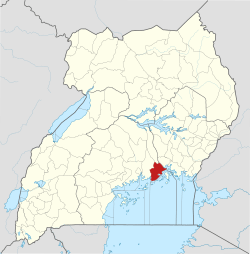Bujagali Energy Limited
Bujagali Energy Limited (BEL), is an electric energy generating company in Uganda. The company owns and operates the Bujagali Power Station, which was the largest hydropower plant in the country as of July 2014.[2]
| Private | |
| Industry | Electric power generation |
| Founded | 2004 |
| Headquarters | Njeru, Uganda |
Key people | John Berry CEO[1] |
| Products | Electricity |
| Website | Homepage |
Overview
BEL is a single purpose company, formed to develop the 250 megawatt Bujagali Hydropower Station. Under arrangements with the government of Uganda (GOU), BEL owns and operates the power plant for 30 years, starting with commissioning. After the 30 years, BEL will transfer ownership of the station to the GOU for US$1.00. The power generated is sold to the Uganda Electricity Transmission Company Limited, the Uganda electricity transmitter monopoly. The power purchase agreements were executed between the concerned parties, in December 2005.[3]
Power stations
BEL owns and operates the Bujagali Hydroelectric Power Station, a 250 megawatt hydropower station built on the Victoria Nile at a cost of US$900 million between 2007 and 2012.[4]
Ownership
As of September 2016, the shareholders in BEL were as listed in the table below.[5] In May 2018, the Daily Nation newspaper reported that Jubilee Holdings Limited was set to invest an additional KSh4.4 billion (US$44 million) the business, in addition to the KSh5.5 billion (US$55 million) that it had already invested.[6] In August 2018, Sithe Global Power of the United States, exited the company and SN Power AS, of Norway acquired shareholding in the business.[7] After the exit of Sithe Global Power in 2018, the shareholding was adjusted as reflected in the table below.[8]
| Rank | Name of Owner | % Ownership in 2018 | % Ownership in 2020 |
|---|---|---|---|
| 1 | Jubilee Investment Company[9] | 8.80[10] | 18.24[8] |
| 2 | Government of Uganda[5] | 10.00 | 10.00 |
| 3 | SN Power AS | 64.89[7] | 55.45[8] |
| 4 | Aga Khan Fund for Economic Development[5] | 16.31 | 16.31 |
| Total | 100.0 | 100.0 | |
Financing
The following entities contributed funds to build the power station. As of July 2019, the restructured debt package was approximately US$500 million, with IFC contributing about US$100 million to the total new loan package.[10]
| No. | Name of Lender | Loan Amount (US$) | Percentage Ownership |
|---|---|---|---|
| 1 | International Finance Corporation[11] | 100[10] | 20.0 |
| 2 | African Development Bank | ||
| 3 | European Investment Bank | ||
| 4 | German Investment Corporation | ||
| 5 | KfW of Germany | ||
| 6 | PROPARCO of France | ||
| 7 | French Development Agency | ||
| 8 | Netherlands Development Finance Company | ||
| Total | 500.00 | 100.00 | |
In December 2017, the Ugandan government reached consensus with the power station's financiers on restructuring the loans and waiving taxes on the power generated, to enable the cost of power to the consumer to reduce.[12] In July 2018, with about US$450 million of the US$900 million construction loan repaid, the remaining loan was restructured and extended for another 15 years, thereby lowering the loan payments and related electricity tariffs to as low as US$0.08 per unit, for large industrial customers.[10] The new lower electricity rates are expected to commence in July 2018.[13]
See also
- Electricity Regulatory Authority
- West Nile Rural Electrification Company
- Kiira Power Station
- Nalubaale Power Station
References
- Okuda, Ivan (21 August 2016). "Kiggundu to oversee Karuma dam project". Daily Monitor. Kampala. Retrieved 1 June 2018.
- Article (31 January 2011). "Bujagali Energy Limited: Powering Opportunity". Bus-Ex.Com Quoting Bujagali Energy Limited. Retrieved 19 July 2014.
- Mwesigye, Shifa (8 August 2013). "One Year On: Bujagali Doubles Power Supply". The Observer (Uganda). Retrieved 19 July 2014.
- Press, Release (8 October 2012). "Ugandan President Museveni And Aga Khan Inaugurate Bujagali Hydropower Plant". The Blackstone Group. Retrieved 19 July 2014.
- Kalinaki, Daniel (4 September 2016). "Uganda urges Bujagali investors to take haircut on project to reduce power costs". The EastAfrican. Nairobi. Retrieved 7 September 2016.
- Mutua, John (31 May 2018). "Jubilee Holdings to pump Sh4.4bn into Bujagali power plant". Daily Nation. Nairobi. Retrieved 1 June 2018.
- Kasemiire, Christine (24 August 2018). "Government Earns Shs300 Billion From Bujagali Buyout Deal". Daily Monitor. Uganda. Retrieved 24 August 2018.
- James Anyanzwa (30 June 2020). "Jubilee Holdings Injects Additional $40 Million In Bujagali Energy". The EastAfrican. Nairobi. Retrieved 1 July 2020.
- Juma, Victor (23 May 2014). "Jubilee Wins 30-Year Pact to Operate Bujagali". Kampala: Daily Monitor. Retrieved 23 May 2014.
- Victor Juma (21 July 2019). "Jubilee restructures its Sh51.5 billion Uganda power plant loans". Business Daily Africa. Nairobi. Retrieved 21 July 2019.
- IFC (20 December 2006). "Bujagali Energy Limited: Summary of Proposed Investment". International Finance Corporation (IFC). Retrieved 19 July 2014.
- Abdallah, Halima (30 December 2017). "Uganda agrees to demands of Bujagali financiers". The EastAfrican. Nairobi. Retrieved 31 December 2017.
- Asiimwe, Dicta (9 July 2018). "Manufacturers win as Bujagali financing extended". The EastAfrican. Nairobi. Retrieved 9 July 2018.
